window JAGUAR X308 1998 2.G Workshop Manual
[x] Cancel search | Manufacturer: JAGUAR, Model Year: 1998, Model line: X308, Model: JAGUAR X308 1998 2.GPages: 2490, PDF Size: 69.81 MB
Page 28 of 2490

В В В В В В В В В В В В В В В В RemovalВ and В Installation В
В В В В В В В В В В В В В В В В В В В В DoorВ (76. 28.04) В
В В В В В В В В В В В В В В В В В В В В FrontВ Doo
rВ
Opening В Weatherstrip В (76.40.01) В
В В В В В В В В В В В В В В В В В В В В FuelВ Filler В Door В (76.10.25) В
В В В В В В В В В В В В В В В В В В В В HoodВ (76.16.01) В
В В В В В В В В В В В В В В В В В В В В HoodВ Hinge В (76.16.12) В
В В В В В В В В В В В В В В В В В В В В HoodВ Striker В (76.16.24) В
В В В В В В В В В В В В В В В В В В В В HoodВ Strut В (76.16.15) В
В В В В В В В В В В В В В В В В В В В В LuggageВ CompartmentВ LidВ Hinge В (76.19.28) В
В В В В В В В В В В В В В В В В В В В В LuggageВ CompartmentВ LidВ Opening В Weatherstrip В (76.19.06) В
В В В В В В В В В В В В В В В В В В В В LuggageВ CompartmentВ LidВ Striker В (76.19.12) В
В В В В В В В В В В В В В В В В В В В В LuggageВ CompartmentВ LidВ Strut В (76.19.27) В
В В В В В В В В В В В В В В В В В В В В RearВ Door В Opening В Weathe
rstripВ (76.40.02) В
В
В В В В В В В В В В В В 501‐05: В Interior В Trim В and В Ornamentation В
В В В В В В В В В В В В В В В В Description В and В Operation В
В В В В В В В В В В В В В В В В В В В В InteriorВ Trim В
В В В В В В В В В В В В В В В В RemovalВ and В Installation В
В В В В В В В В В В В В В В В В В В В В A‐PillarВ TrimВ PanelВ (76.13.31) В
В В В В В В В В В В В В В В В В В В В В B‐PillarВ TrimВ PanelВ (76.13.28) В
В В В В В В В В В В В В В В В В В В В В CowlВ Side В Trim В PanelВ (76.13.30) В
В В В В В В В В В В В В В В В В В В В В C‐Pillar В Trim В PanelВ (76.13.73) В
В В В В В В В В В В В В В В В В В В В В DoorВ WindowВ ControlВ Switch В FinishВ Pane
lВ (76.47.33) В
В В В В В В В В В В В В В В В В В В В В EngineВ Cover В (76.11.35) В
В В В В В В В В В В В В В В В В В В В В FloorВ Covering В (76.49.08) В
В В В В В В В В В В В В В В В В В В В В FoldingВ Tray В (76.47.31) В
В В В В В В В В В В В В В В В В В В В В FoldingВ Tray В Finish В Panel В (76.47.32) В
В В В В В В В В В В В В В В В В В В В В FrontВ DoorВ Armrest В (76.34.22) В
В В В В В В В В В В В В В В В В В В В В FrontВ DoorВ TrimВ PanelВ FinishВ Panel В (76.47.11) В
В В В В В В В В В В В В В В В В В В В В FrontВ DoorВ Stowage В CompartmentВ (76.34.27)В
В В В В В В В В В В В В В В В В В В В В FrontВ DoorВ TrimВ PanelВ (76.34.01) В
В В В В В В В В В В В В В В В В В В В В HeadlinerВ (76.64.01) В
В В В В В В В В В В В В В В В В В В В В LuggageВ CompartmentВ FrontВ TrimВ PanelВ (76.19.31) В
В В В В В В В В В В В В В В В В В В В В LuggageВ Compart
mentВ LidВ Trim В Panel В (76.19.05) В
В В В В В В В В В В В В В В В В В В В В LuggageВ CompartmentВ RearВ Trim В PanelВ (76.19.44) В
В В В В В В В В В В В В В В В В В В В В LuggageВ CompartmentВ SideВ Trim В PanelВ (76.19.22) В
В В В В В В В В В В В В В В В В В В В В OverheadВ Console В Finish В PanelВ (76.47.41) В
Page 29 of 2490

В В В В В В В В В В В В В В В В В В В В ParcelВ ShelfВ (76.67. 06)В
В В В В В В В В В В В В В В В В В В В В ParcelВ Shelf
В
SupportВ (76.67.09) В
В В В В В В В В В В В В В В В В В В В В PassengerВ Assist В Handle В (76.58.30) В
В В В В В В В В В В В В В В В В В В В В RearВ Door В Armrest В (76.34.23) В
В В В В В В В В В В В В В В В В В В В В RearВ Door В Trim В PanelВ FinishВ PanelВ (76.47.12) В
В В В В В В В В В В В В В В В В В В В В RearВ Door В Trim В PanelВ (76.34.04) В
В В В В В В В В В В В В В В В В В В В В RearВ Window В BlindВ (76.14.04) В
В В В В В В В В В В В В В В В В В В В В RearВ Door В Window В Control В Switch В Finish В PanelВ (76.47.34) В
В В В В В В В В В В В В В В В В В В В В ScuffВ PlateВ Trim В Panel В (76.13.81) В
В В В В В В В В В В В В В В В В В В В В SunВ Visor В (76.10.48) В
В
            501‐08:  Exterior  Trim  and  Or
namentation В
В В В В В В В В В В В В В В В В Description В and В Operation В
В В В В В В В В В В В В В В В В В В В В ExteriorВ Trim В
В В В В В В В В В В В В В В В В RemovalВ and В Installation В
В В В В В В В В В В В В В В В В В В В В A‐PillarВ Moulding В LH В (76.13.19) В
В В В В В В В В В В В В В В В В В В В В A‐PillarВ Moulding В RH В (76.13.20) В
В В В В В В В В В В В В В В В В В В В В CoachlinesВ
В В В В В В В В В В В В В В В В В В В В DoorВ Moulding В (76.43.72) В
В В В В В В В В В В В В В В В В В В В В FrontВ Fender В Moulding В (76.10.48) В (76.43.73) В
В В В В В В В В В В В В В В В В В В В В LuggageВ CompartmentВ LidВ Badges В (76.44.03) В
В В В В В В В В В В В В В В В В В В В В LuggageВ CompartmentВ LidВ Moulding В (76.43.79) В
В В В В В В В В В В В В В В В В В В В В RadiatorВ GrilleВ (76.
55.03) В
В В В В В В В В В В В В В В В В В В В В RadiatorВ GrilleВ Bezel В (76.55.15) В
В
В В В В В В В В В В В В 501‐09: В Rear В View В MirrorsВ
В В В В В В В В В В В В В В В В Description В and В Operation В
В В В В В В В В В В В В В В В В В В В В RearВ View В Mirrors В
В В В В В В В В В В В В В В В В RemovalВ and В Installation В
В В В В В В В В В В В В В В В В В В В В Auto‐Dimming В Interior В MirrorВ (76.10.56) В
В В В В В В В В В В В В В В В В В В В В ExteriorВ Mirror В (76.10.52) В
В В В В В В В В В В В В В В В В В В В В ExteriorВ Mirror В CoverВ (76.10.55) В
В В В В В В В В В В В В В В В В В В В В ExteriorВ Mirror В Glass В (76.10.53) В
В В В В В В В В В В В В В В В В В В В В ExteriorВ Mirror В MotorВ (76.10.57) В (76.11.09) В
В В В В В В В В В В В В В В В В В В В В InteriorВ MirrorВ (76.10.51) В
В В В В В В В В В В В В В В В В В В В В InteriorВ Mirro
rВ Mounting В BlockВ (76.10.62) В
В
Page 30 of 2490

В В В В В В В В В В В В 501‐10: В SeatingВ
В В В В В В В В В В В В В В В В Specificatio
n
В
В В В В В В В В В В В В В В В В Description В and В Operation В
В В В В В В В В В В В В В В В В В В В В SeatsВ
В В В В В В В В В В В В В В В В RemovalВ and В Installation В
В В В В В В В В В В В В В В В В В В В В FrontВ SeatВ (76.70.01) В
В В В В В В В В В В В В В В В В В В В В FrontВ SeatВ Backrest В (76.70.06) В
В В В В В В В В В В В В В В В В В В В В FrontВ SeatВ Backrest В Cover В (76.70.15) В
В В В В В В В В В В В В В В В В В В В В FrontВ SeatВ Backrest В Heater В Mat В (86.75.14) В
В В В В В В В В В В В В В В В В В В В В FrontВ SeatВ Backrest В Trim В Panel В (76.70.03) В
В В В В В В В В В В В В В В В В В В В В FrontВ SeatВ Cushion В (76.70.11) В
В В В В В В В В В В В В В В В В В В В В FrontВ SeatВ Cushion В Cover В (76.70.33) В
В В В В В В В В В В В В В В В В В В В В FrontВ Sea
tВ Cushion В Heater В Mat В (86.75.13) В
В В В В В В В В В В В В В В В В В В В В FrontВ SeatВ Head В Restraint В (76.70.14) В
В В В В В В В В В В В В В В В В В В В В FrontВ SeatВ Head В Restraint В Motor В (86.75.17) В
В В В В В В В В В В В В В В В В В В В В FrontВ SeatВ Recliner В Motor В (86.75.04) В
В В В В В В В В В В В В В В В В В В В В FrontВ SeatВ Track В (76.70.20) В
В В В В В В В В В В В В В В В В В В В В FrontВ SeatВ Track В Motor В (86.75.33) В
В В В В В В В В В В В В В В В В В В В В LumbarВ Motor В (86.75.12) В
В В В В В В В В В В В В В В В В В В В В RearВ Seat В Armrest В (76.70.39) В
В В В В В В В В В В В В В В В В В В В В RearВ Seat В Backrest В (76.70.38) В
В В В В В В В В В В В В В В В В В В В В RearВ Seat В Backrest В Cover В (76.70.48) В (78.90.12) В
В В В В В В В В В В В В В В В В В В В В RearВ Seat В Backrest В Heater В Mat В (86.75.35) В
В В В В В В В В В В В В В В В В В В В В RearВ Seat В Cushio
nВ (76.70.37) В
В В В В В В В В В В В В В В В В В В В В RearВ Seat В Cushion В Cover В (76.70.47) В
В В В В В В В В В В В В В В В В В В В В RearВ Seat В Cushion В Heater В Mat В (86.75.37) В
В В В В В В В В В В В В В В В В В В В В RearВ Seat В Head В Restraint В (76.70.56) В
В В В В В В В В В В В В В В В В В В В В RearВ Seat В Track В
В В В В В В В В В В В В В В В В В В В В SeatВ Control В SwitchВ (86.75.23) В
В
В В В В В В В В В В В В 501‐11: В Glass, В Frames В and В Mechanisms В
В В В В В В В В В В В В В В В В Description В and В Operation В
В В В В В В В В В В В В В В В В В В В В Glass,В Fra
mes В and В Mechanisms В
В В В В В В В В В В В В В В В В RemovalВ and В Installation В
В В В В В В В В В В В В В В В В В В В В DoorВ WindowВ ControlВ Switch В Bulb В (86.46.12) В
В В В В В В В В В В В В В В В В В В В В FrontВ DoorВ Window В GlassВ (76.31.01) В
В В В В В В В В В В В В В В В В В В В В FrontВ DoorВ Window В GlassВ Weatherstrip В (76.40.28) В
Page 31 of 2490

В В В В В В В В В В В В В В В В В В В В FrontВ Doo r
В
Window В Regulator В and В Motor В (76.31.45) В
В В В В В В В В В В В В В В В В В В В В FrontВ DoorВ Window В Regulator В Motor В (76.31.45) В
В В В В В В В В В В В В В В В В В В В В FrontВ DoorВ Window В Control В Switch В (86.25.07) В
В В В В В В В В В В В В В В В В В В В В RearВ Door В Window В GlassВ (76.31.02) В
В В В В В В В В В В В В В В В В В В В В RearВ Door В Window В GlassВ Weatherstrip В (76.40.29) В
В В В В В В В В В В В В В В В В В В В В RearВ Door В Window В Regulator В and В Motor В (86.25.09) В
В В В В В В В В В В В В В В В В В В В В RearВ Door В Window В Regulator В Motor В (86.25.09) В
В В В В В В В В В В В В В В В В В В В В RearВ Door В Window В Control В Swi
tchВ (86.25.10) В
В В В В В В В В В В В В В В В В В В В В RearВ Quarter В Window В GlassВ (76.31.31) В
В В В В В В В В В В В В В В В В В В В В RearВ Window В GlassВ (76.81.11) В
В В В В В В В В В В В В В В В В В В В В Windshield В GlassВ (76.81.40) В
В
В В В В В В В В В В В В 501‐12: В Instrument В Panel В and В Console В
В В В В В В В В В В В В В В В В Specification В
В В В В В В В В В В В В В В В В Description В and В Operation В
В В В В В В В В В В В В В В В В В В В В Instrument В PanelВ andВ Instrument В Panel В Console В
В В В В В В В В В В В В В В В В RemovalВ and В Installation В
В В В В В В В В В В В В В В В В В В В В AudioВ Unit В Housing В (76.25.15) В
В В В В В В В В В В В В В В В В В В В В ClimateВ ControlВ AssemblyВ HousingВ
В В В В В В В В В В В В В В В В В В В В CoinВ Stowage В CompartmentВ (76.46.37) В
В В В В В В В В В В В В В В В В В В В В FloorВ Co
nsole В (76.25.01) В
В В В В В В В В В В В В В В В В В В В В FloorВ Console В Ashtray В (76.25.25) В
В В В В В В В В В В В В В В В В В В В В FloorВ Console В Extension В (76.25.05) В
В В В В В В В В В В В В В В В В В В В В FloorВ Console В Finish В Panel В (76.47.26) В
В В В В В В В В В В В В В В В В В В В В FloorВ Console В Finish В Panel В Bracket В (76.25.26) В
В В В В В В В В В В В В В В В В В В В В FloorВ Console В Stowage В CompartmentВ (76.25.16)В
В В В В В В В В В В В В В В В В В В В В FloorВ Console В Stowage В CompartmentВ LidВ (76.25.18) В
В В В В В В В В В В В В В В В В В В В В GloveВ CompartmentВ (76.52.03)В
В В В В В В В В В В В В В В В В В В В В GloveВ CompartmentВ LidВ (76.52.02) В
В В В В В В В В В В В В В В В В В В В В GloveВ CompartmentВ LidВ DamperВ (76.52.22) В
В В В В В В В В В В В В В В В В В В В В GloveВ Co
mpartment В Liner В (76.52.21) В
В В В В В В В В В В В В В В В В В В В В Instrument В ClusterВ FinishВ Panel В (76.47.24) В
В В В В В В В В В В В В В В В В В В В В Instrument В ClusterВ FinishВ Panel В Bezel В (88.20.33) В
В В В В В В В В В В В В В В В В В В В В Instrument В PanelВ (76.46.01) В
В В В В В В В В В В В В В В В В В В В В Instrument В PanelВ FinishВ PanelВ (76.47.06) В
В В В В В В В В В В В В В В В В В В В В Instrument В PanelВ Lower В Trim В Panel В (76.46.11) В
В В В В В В В В В В В В В В В В В В В В OverheadВ Console В (76.13.69) В
Page 467 of 2490

High
-pitched sound like rubbing a clean window.
Squea
l
Continu
ous, high-pitched sound like runn
ing finger nails across a chalkboard.
Tap
Ligh
t, hammering sound like tapping pencil on edge
of table. May be rhythmic or intermittent.
Weep
Continu
ous mid-range sound (lower frequency
than squeal, higher frequency than groan).
Whir/
Whine
High
-pitched buzzing sound, like
an electric motor or drill.
Whistle
Sharp, shril
l sound, like wi
nd passing a small opening.
Description of Specific St eer
ing System Noise Types
Bel
t Squeal
Belt squea
l is a high frequency air-born
e noise generated by slippage of the ribbe d Vee belt on the power steering pump
pulley. Squeal increases with system loading and at the end of lock.
Clonk
Cl
onk is a structure-borne nois
e heard as a loose-sounding rattle or vibration coming from the steering column. Clonk can
be identified by driving and turning over cobblestones, rough roads, or high frequency bumps such as 25-50 mm tall tar
strips. Clonk requires a tie-rod load impact.
Column Knoc
k
Col
umn knock is a loose-sounding rattle or
vibration generated by the steering column shaft contacting other portions of the
column assembly. The noise is both audible and tactile. Column knock is generate d by driving over cobblestones or rough
pavement. It is not necessary to turn the steering wheel to create this noise.
Column Ra
ttle
Co
lumn rattle is a metallic sounding no
ise created when applying a highly impuls ive force to the steering wheel. Column
rattle is often used to combine the more general group of column noises includin g clonk and column knock. Column rattle
noises can be caused by clonk, knock, l oose column components, bonus parts etc. A series of parked, straight-line driving,
and cornering test should be carried out to isolate the source/sources.
Gr
inding/Scrape
Gr
inding is a low frequency noise in the column when the st
eering wheel is turned. Is generally caused by interference
between moving components such as the st eering wheel to steering column shroud.
Gr
unt (Squawk)
Grunt
is a "honking" sound elicited when coming off one of
the steering stops. Grunt is generally excited during parking
manoeuvres with a low to me dium speed steering input.
Squea
k
Page 515 of 2490
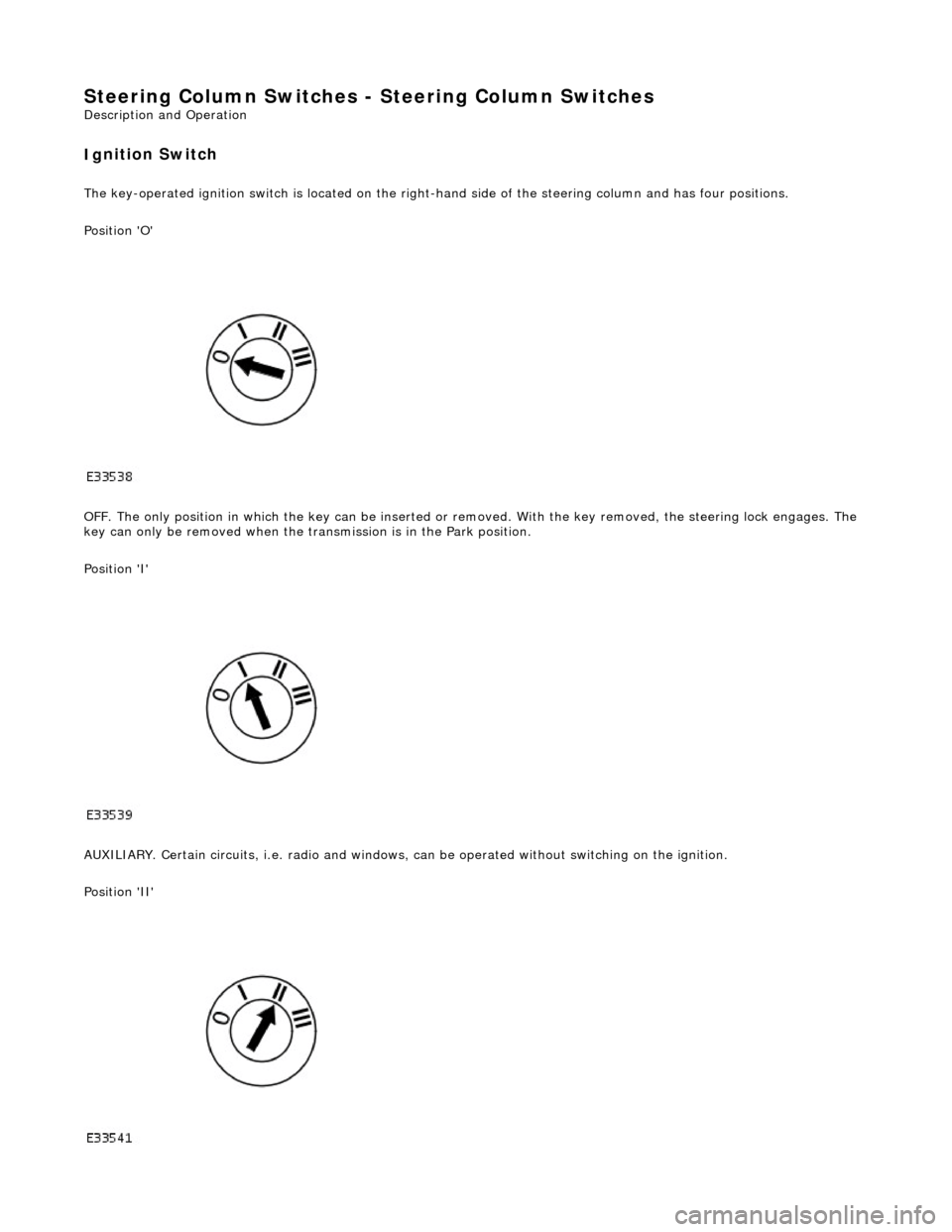
Steering Column Switches - Steering Column Switches
Description an
d Operation
Ig
nition Switch
The k
ey-operated ignition switch is located on the right-hand side of the steering colu
mn and has four positions.
Position 'O'
OFF. The only position in which the key can be inserted or re moved. With the key removed, the steering lock engages. The
key can only be removed when the tran smission is in the Park position.
Position 'I'
AUXILIARY. Certain circuits , i.e. radio and windows, can be operat ed without switching on the ignition.
Position 'II'
Page 1976 of 2490
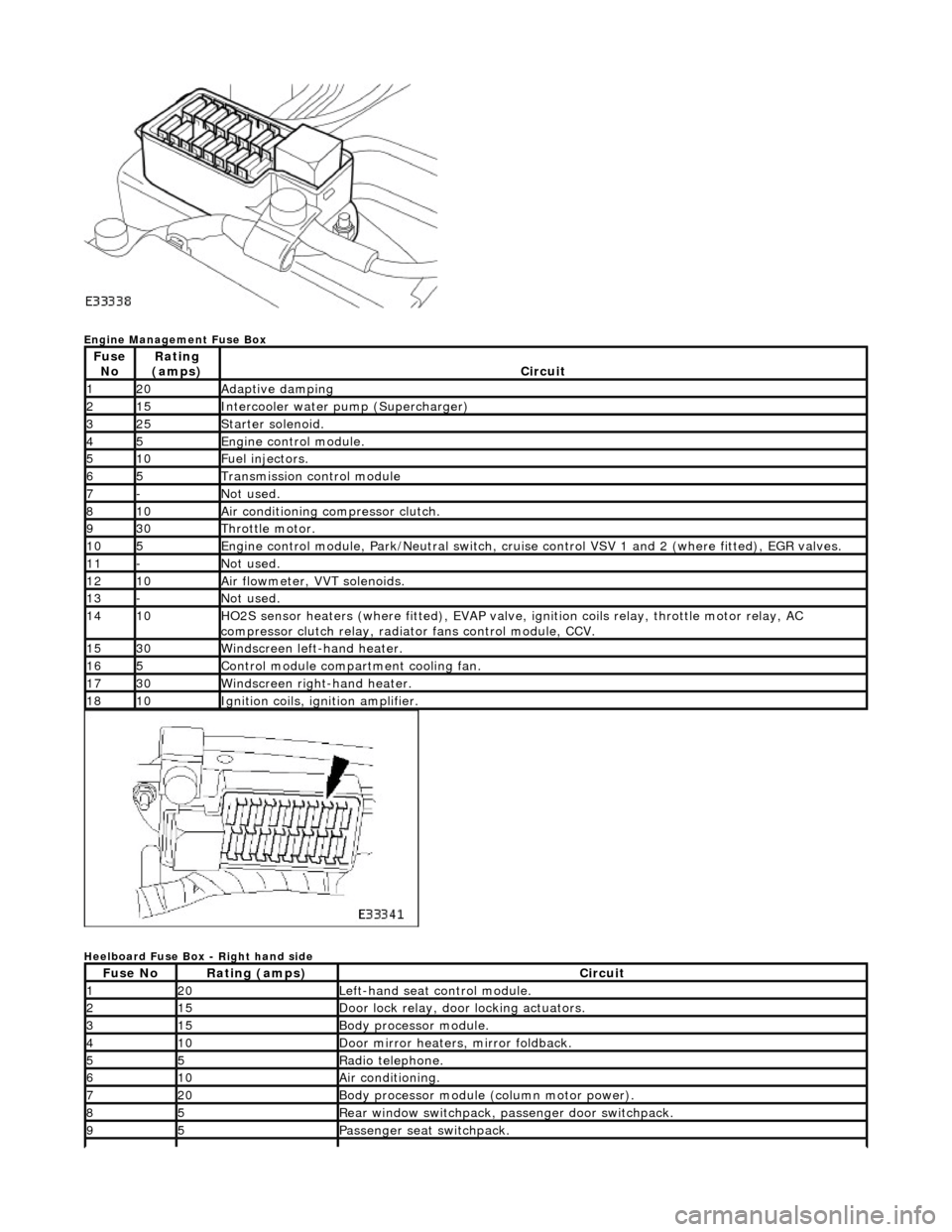
Engine Management Fuse Box
Heelboard Fuse Box - Right hand side
Fuse NoRating
(amps)Circuit
120Adaptive damping
215Intercooler water pump (Supercharger)
325Starter solenoid.
45Engine control module.
510Fuel injectors.
65Transmission control module
7-Not used.
810Air conditioning compressor clutch.
930Throttle motor.
105Engine control module, Park/Neutr al switch, cruise control VSV 1 and 2 (where fitted), EGR valves.
11-Not used.
1210Air flowmeter, VVT solenoids.
13-Not used.
1410HO2S sensor heaters (where fitted ), EVAP valve, ignition coils relay, throttle motor relay, AC
compressor clutch relay, radi ator fans control module, CCV.
1530Windscreen left-hand heater.
165Control module compartment cooling fan.
1730Windscreen right-hand heater.
1810Ignition coils, ignition amplifier.
Fuse NoRating (amps)Circuit
120Left-hand seat control module.
215Door lock relay, door locking actuators.
315Body processor module.
410Door mirror heaters, mirror foldback.
55Radio telephone.
610Air conditioning.
720Body processor module (column motor power).
85Rear window switchpack, passenger door switchpack.
95Passenger seat switchpack.
Page 1977 of 2490
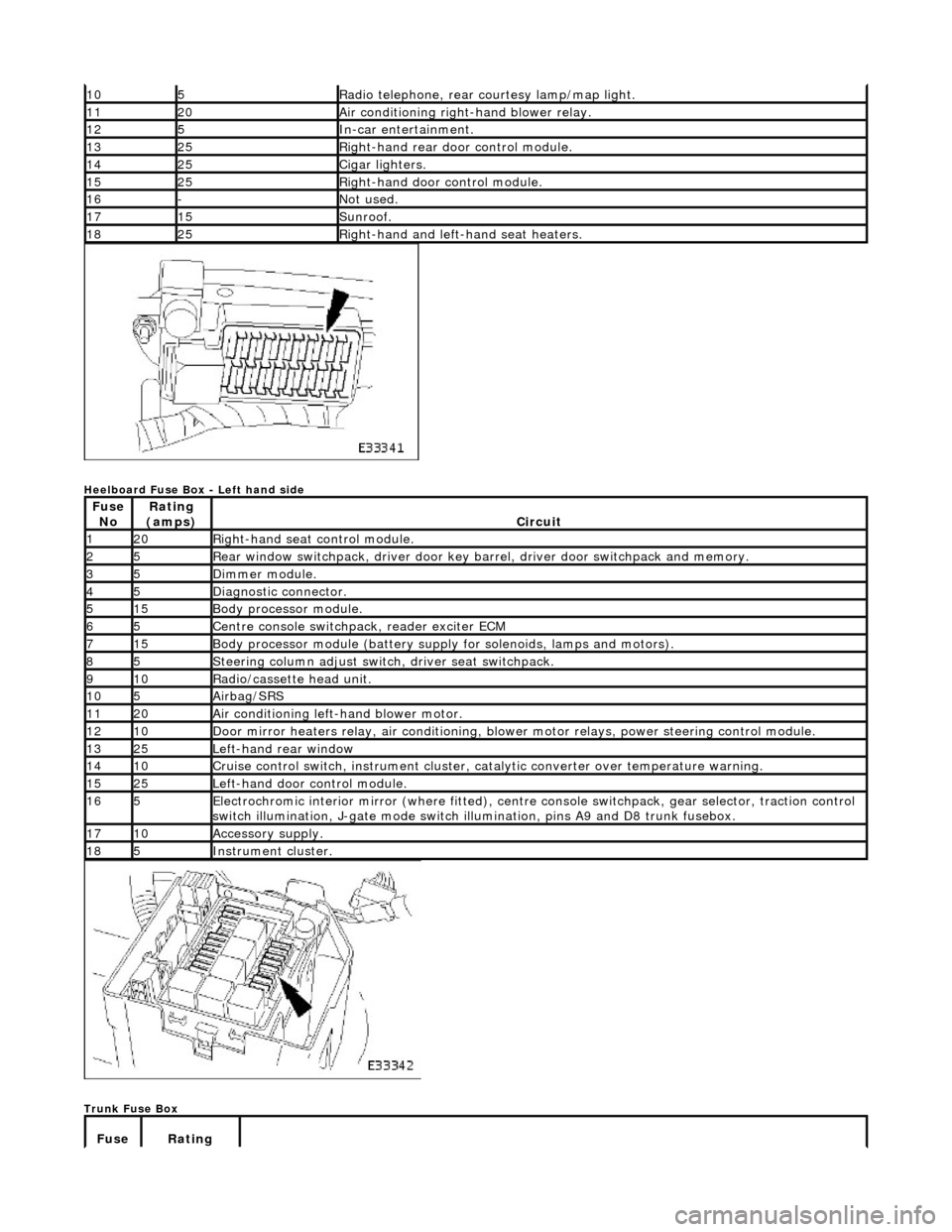
Heelboard Fuse Box - Left hand side
Trunk Fuse Box
105Radio telephone, rear courtesy lamp/map light.
1120Air conditioning right-hand blower relay.
125In-car entertainment.
1325Right-hand rear door control module.
1425Cigar lighters.
1525Right-hand door control module.
16-Not used.
1715Sunroof.
1825Right-hand and left-hand seat heaters.
Fuse NoRating
(amps)Circuit
120Right-hand seat control module.
25Rear window switchpack, driver door key ba rrel, driver door switchpack and memory.
35Dimmer module.
45Diagnostic connector.
515Body processor module.
65Centre console switchpack, reader exciter ECM
715Body processor module (battery supply for solenoids, lamps and motors).
85Steering column adjust switch, driver seat switchpack.
910Radio/cassette head unit.
105Airbag/SRS
1120Air conditioning left-hand blower motor.
1210Door mirror heaters relay, air conditioning, blow er motor relays, power steering control module.
1325Left-hand rear window
1410Cruise control switch, instrument cluster, catalytic converter over temperature warning.
1525Left-hand door control module.
165Electrochromic interior mirror (where fitted), centre console switchpack, gear selector, traction control
switch illumination, J-gate mode switch illumination, pins A9 and D8 trunk fusebox.
1710Accessory supply.
185Instrument cluster.
Fuse Rating
Page 1981 of 2490
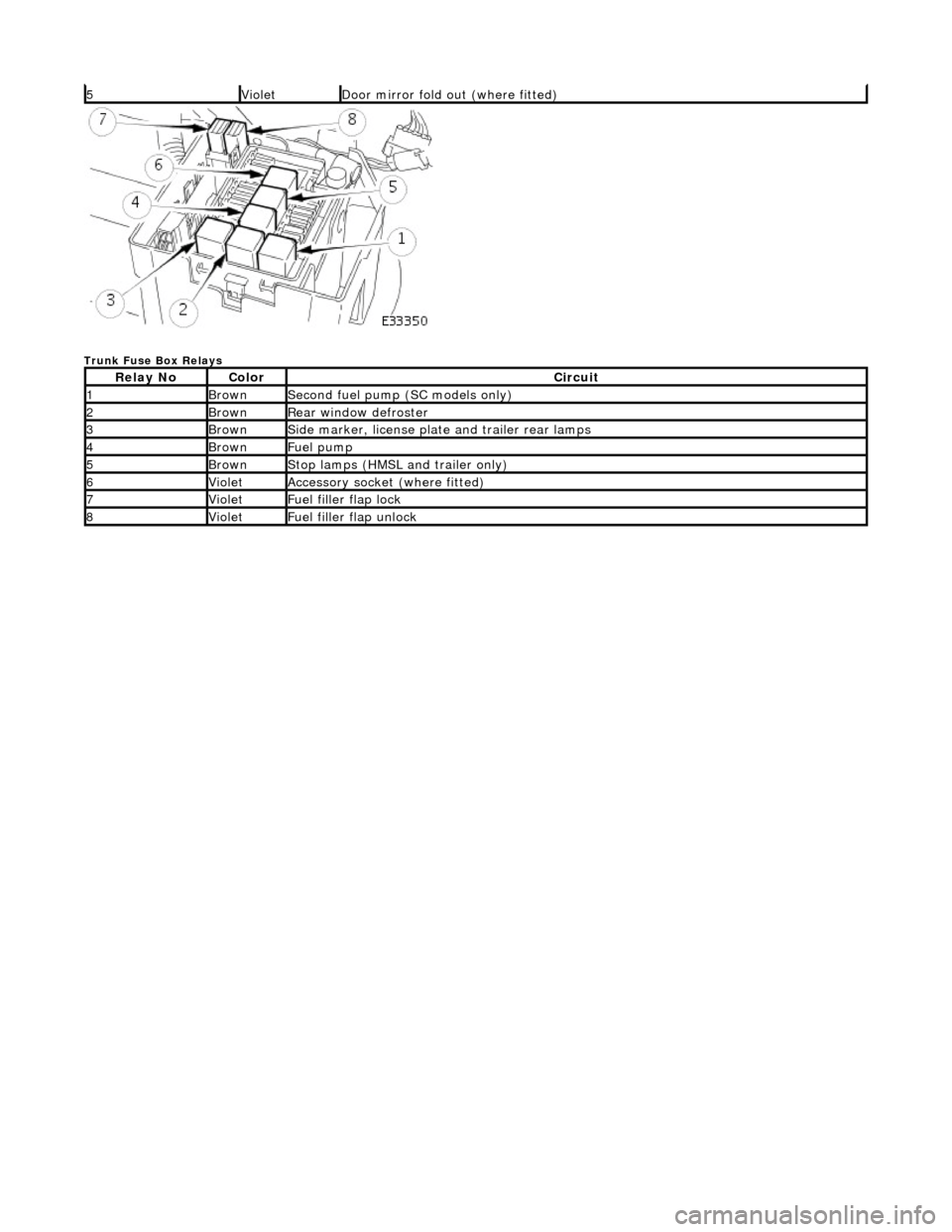
Trunk Fuse Box Relays
5VioletDoor mirror fold out (where fitted)
Relay NoColorCircuit
1BrownSecond fuel pump (SC models only)
2BrownRear window defroster
3BrownSide marker, license plate and trailer rear lamps
4BrownFuel pump
5BrownStop lamps (HMSL and trailer only)
6VioletAccessory socket (where fitted)
7VioletFuel filler flap lock
8VioletFuel filler flap unlock
Page 2002 of 2490
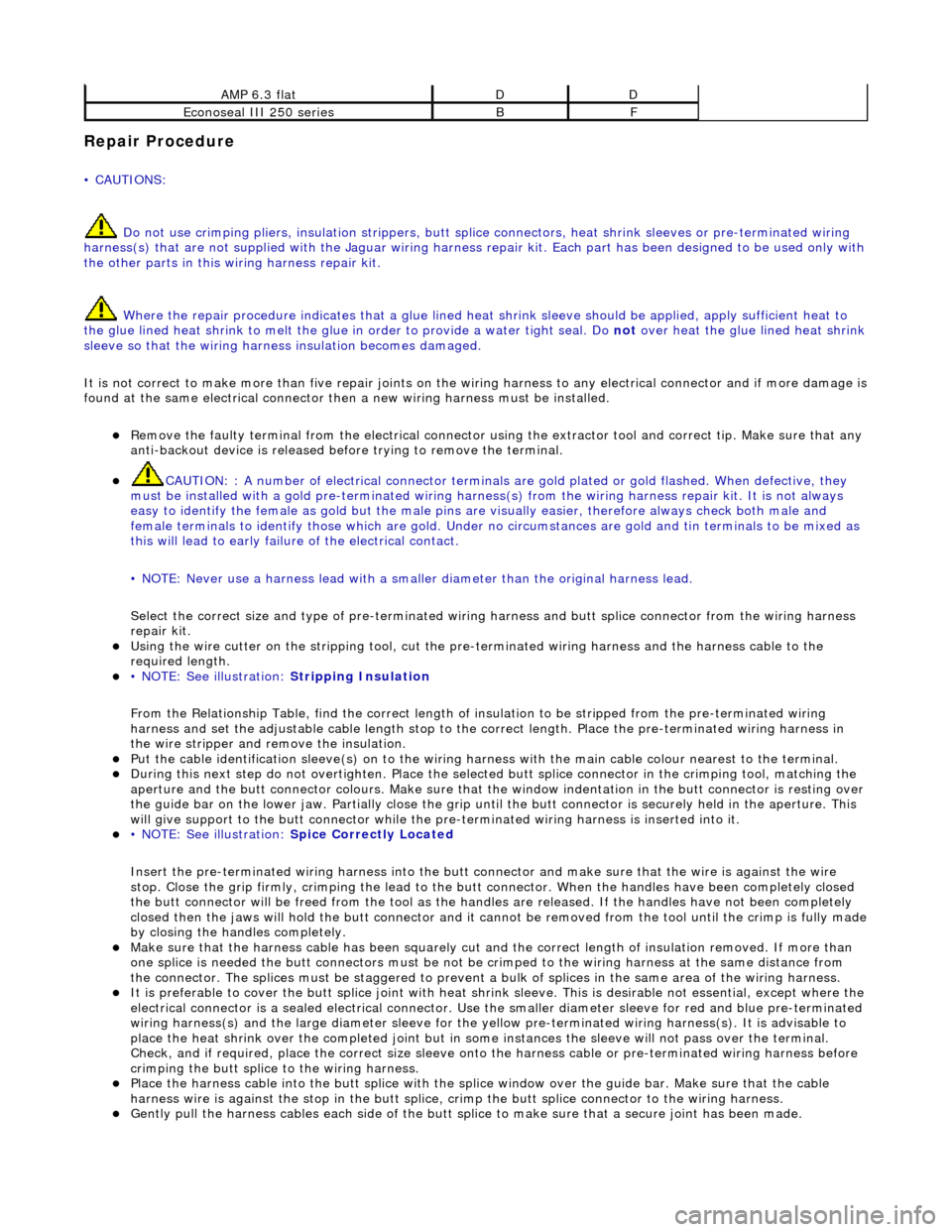
Repair Procedure
• CAUTIONS: Do not use crimping pliers, insulation strippers, butt splice connectors, heat sh rink sleeves or pre-terminated wiring
harness(s) that are not supplied with the Jagu ar wiring harness repair kit. Each part has been designed to be used only with
the other parts in this wiri ng harness repair kit.
Where the repair procedure indicates that a glue lined heat shrink sleeve should be applied, apply sufficient heat to
the glue lined heat shrink to melt the glue in order to provide a water tight seal. Do not
over heat the glue lined heat shrink sleeve so that the wiring harness insulation becomes damaged.
It is not correct to make more than five repair joints on the wiring harness to any electrical connector and if more damage is
found at the same electrical connector then a new wiring harness must be installed.
пЃ¬Remove the faulty terminal from the elec trical connector using the extractor tool and correct tip. Make sure that any
anti-backout device is released befo re trying to remove the terminal.
пЃ¬CAUTION: : A number of electrical connector terminals ar e gold plated or gold flashed. When defective, they
must be installed with a gold pre-terminated wiring harnes s(s) from the wiring harness repair kit. It is not always
easy to identify the female as gold but the male pins are visually easier, therefore always check both male and
female terminals to identify those which are gold. Under no circumstances are gold and tin terminals to be mixed as
this will lead to early failur e of the electrical contact.
• NOTE: Never use a harness lead with a smalle r diameter than the original harness lead.
Select the correct size and ty pe of pre-terminated wiring harness and butt splice connector from the wiring harness
repair kit.
пЃ¬Using the wire cutter on the stripping tool, cut the pre-terminated wiring harness and the harness cable to the
required length.
• NOTE: See illustration: Stripping Insulation
From the Relationship Table, find the correct length of insulation to be stripped from the pre-terminated wiring
harness and set the adjustable cable length stop to the correct length. Place the pre-terminated wiring harness in
the wire stripper and remove the insulation.
пЃ¬Put the cable identification sleeve(s) on to the wiring harness with the main cable colour nearest to the terminal. пЃ¬During this next step do not overtighten. Place the selected butt splice connector in the crimping tool, matching the
aperture and the butt connector colours. Make sure that the window indentation in the butt connector is resting over
the guide bar on the lower jaw. Partially close the grip until the butt connec tor is securely held in the aperture. This
will give support to the butt conn ector while the pre-terminated wiring harness is inserted into it.
• NOTE: See illustration: Spice Correctly Located
Insert the pre-terminated wiring harnes s into the butt connector and make sure that the wire is against the wire
stop. Close the grip firmly, crimping the lead to the butt connector. When the handles have been completely closed
the butt connector will be fre ed from the tool as the handles are released. If the handles have not been completely
closed then the jaws will hold the butt connector and it cannot be removed from the tool until the crimp is fully made
by closing the handles completely. пЃ¬Make sure that the harness cable has been squarely cut and the correct length of insulation removed. If more than
one splice is needed the butt connectors must be not be crimped to the wiring harness at the same distance from
the connector. The splices must be staggered to prevent a bulk of splices in the same area of the wiring harness.
пЃ¬It is preferable to cover the butt splice joint with heat shrink sleeve. This is desirable not essential, except where the
electrical connector is a sealed electrical connector. Use the smaller diameter sleeve for red and blue pre-terminated
wiring harness(s) and the large diameter sleeve for the yellow pre-terminated wiring harnes s(s). It is advisable to
place the heat shrink over the completed joint but in some instances the sleeve will not pass over the terminal.
Check, and if required, place the correct size sleeve onto the harness cable or pre-terminated wiring harness before
crimping the butt splice to the wiring harness.
пЃ¬Place the harness cable into the butt splice with the spli ce window over the guide bar. Make sure that the cable
harness wire is agains t the stop in the butt splice, crimp the butt splice connector to the wiring harness.
пЃ¬Gently pull the harness cables each side of the butt sp lice to make sure that a secure joint has been made.
AMP 6.3 flatDD
Econoseal III 250 seriesBF